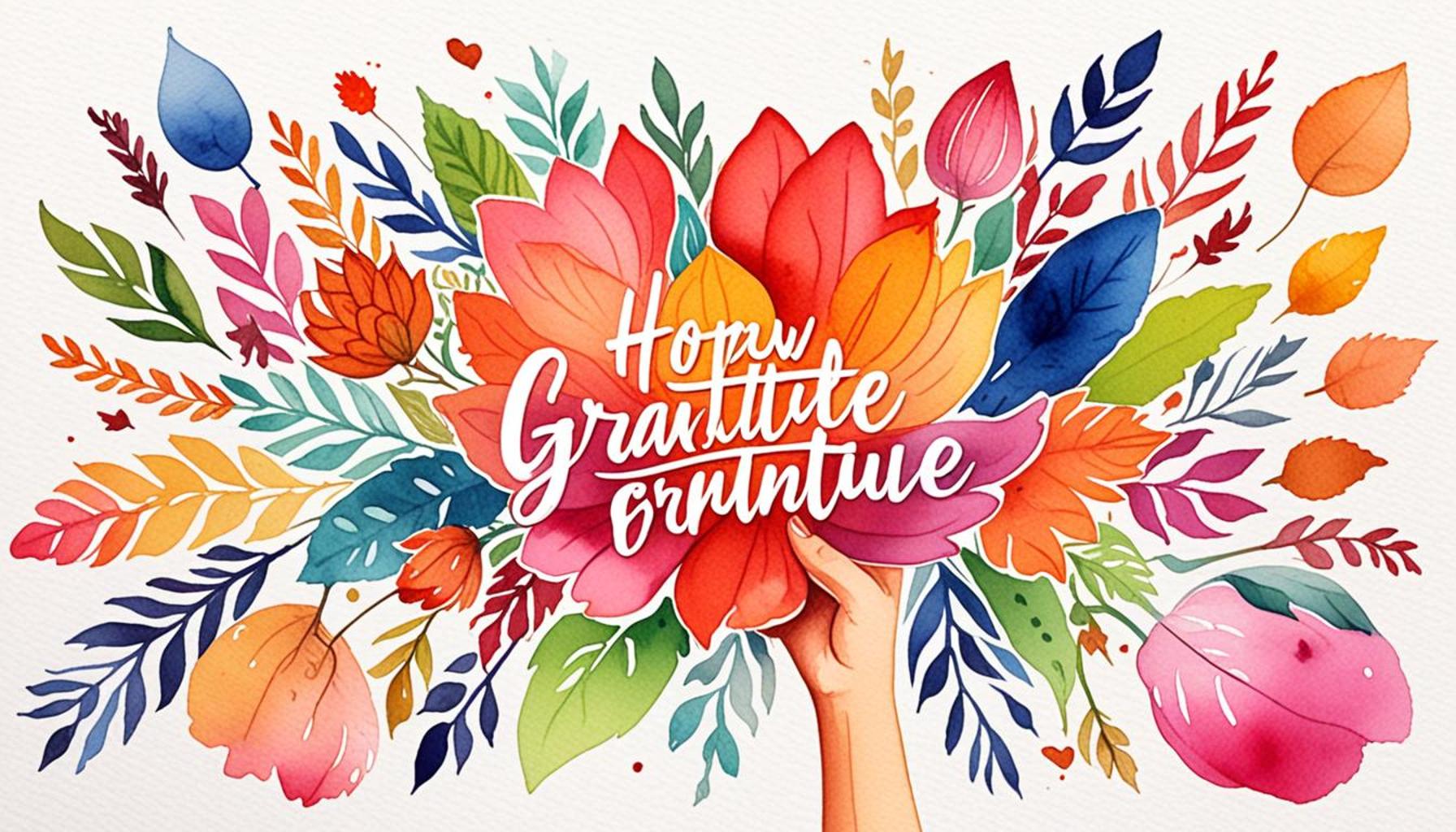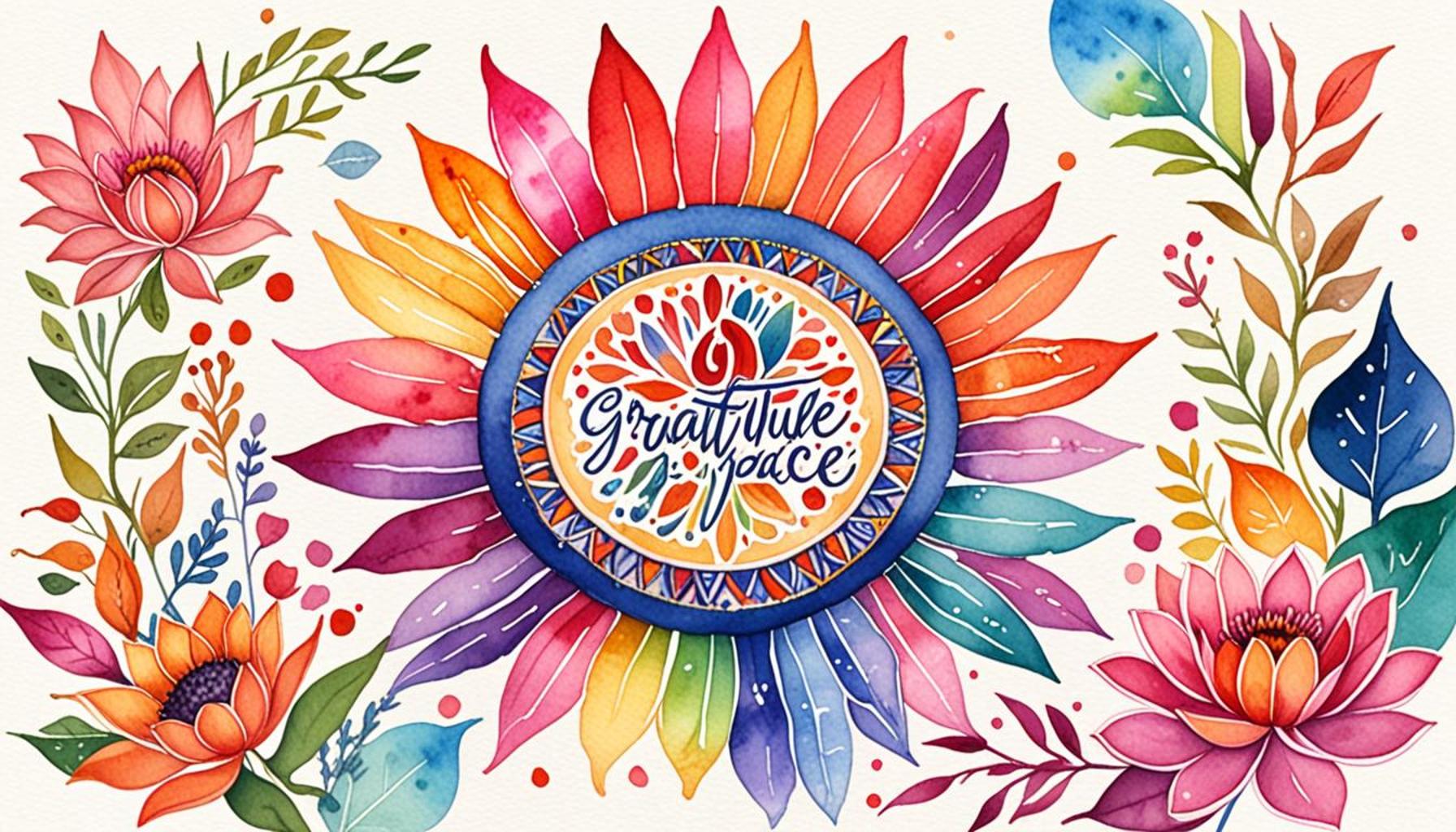Gratitude as a Self-Help Tool: Overcoming Challenges with Positivity

The Power of Gratitude
In our daily lives, particularly during challenging times, the practice of gratitude emerges as a beacon of hope and resilience. It serves not only as a coping mechanism but also as a means to cultivate a positive mindset that can significantly alter our emotional landscape. Numerous studies highlight this transformative power, revealing that gratitude can yield measurable improvements in mental health conditions such as depression and anxiety.
Benefits of Practicing Gratitude
Engaging in gratitude practices can lead to a multitude of benefits that enhance our overall well-being:
- Enhanced mood: Regularly acknowledging what we are thankful for fosters a sense of joy and appreciation. Simple practices like maintaining a gratitude journal, where you note three things you are grateful for each day, can uplift your spirits and create a lasting positive impact.
- Improved relationships: Expressing appreciation—whether through verbal affirmations or thoughtful gestures—can nurture and strengthen the bonds we share with loved ones. Think about occasions where a heartfelt thank-you or a simple compliment has solidified your friendships or family ties.
- Better stress management: By shifting focus from negative to positive experiences, individuals can find relief from feelings of anxiety and tension. Incorporating mindfulness practices that emphasize gratitude can empower people to manage stress in a more effective manner.
Gratitude in Nigeria: A Unique Context
In Nigeria, where economic and social challenges are often faced, the practice of gratitude takes on a particularly important role. Individuals who consciously incorporate gratitude into their daily lives gather strength from the rich tapestry of their experiences and surroundings:
- Community support: Acknowledging the importance of communal ties can foster a sense of belonging and collective resilience. For instance, neighborhood gatherings and cooperative efforts during festivities not only celebrate shared successes but also reinforce social bonds that are vital in times of crisis.
- Everyday successes: Celebrating small victories, such as completing a project at work or successfully cooking a traditional meal, can provide motivation and encouragement amidst larger challenges. Recognizing these moments nurtures a mindset oriented towards positivity and growth.
- Cultural heritage: By appreciating local traditions and practices that celebrate resilience—like storytelling events or cultural festivals—individuals can draw inspiration from their roots and find solace in community customs that have endured through generations.
Ultimately, by embracing a mindset of gratitude, individuals can navigate life’s inevitable difficulties with grace and determination. This not only leads to personal growth but also fosters a collective spirit of positivity that can uplift entire communities. As we delve deeper into the facets of gratitude, it becomes evident that cultivating appreciation is not merely an act of acknowledgment; it is a profound journey towards nurturing hope and resilience, guiding us toward a brighter outlook even in the most trying times.
SEE ALSO: Click here to read another article

Unlocking the Benefits of Gratitude
The path to personal growth and emotional resilience is often paved with the practice of gratitude. Cultivating a habit of thankfulness empowers individuals to shift their focus from the hurdles they face to the blessings they experience, creating a profound shift in perspective. Various psychological studies and surveys have consistently shown that the act of acknowledging our blessings can lead to a significant reducing of psychological distress. For instance, individuals who can reflect on positive aspects of their lives tend to report lower levels of stress, anxiety, and depression.
Ways Gratitude Can Transform Your Life
Incorporating gratitude into daily routines can manifest in numerous ways that enhance our quality of life:
- Boosting Self-Esteem: Emphasizing gratitude helps counteract negative self-talk. When individuals recognize and appreciate their accomplishments and strengths, they foster a more positive self-image. Research has found that people who practice gratitude regularly are more likely to have higher self-esteem.
- Promoting Resilience: Life’s challenges can feel insurmountable at times; however, expressing gratitude can strengthen the psychological defenses that allow individuals to bounce back from adversity. Those who focus on gratitude are better equipped to manage setbacks without becoming overwhelmed.
- Fostering Optimism: Cultivating a sense of gratitude is essential for developing a more optimistic outlook on life. By actively seeking out positive moments and reflecting on them, individuals can rewire their brains to focus on opportunities rather than obstacles.
Integrating Gratitude Into Daily Life
In Nigeria, the value of gratitude is deeply intertwined with social customs and communal life. To effectively harness the power of gratitude as a self-help tool, one may consider these practical strategies:
- Morning Affirmations: Start the day by expressing gratitude for the gift of a new morning and the opportunities that lie ahead. This habit can set a positive tone for the day.
- Gratitude Rituals: Create cultural rituals that incorporate gratitude, such as sharing compliments during social gatherings or dedicating time each week for family discussions about things everyone is grateful for.
- Thank-you Notes: In a society rich with interpersonal relationships, writing thank-you notes can be a powerful tool. A small token of appreciation can positively impact both the giver and the receiver, reinforcing community bonds.
As individuals practice gratitude in these various forms, they can cultivate a reservoir of positivity that becomes invaluable. With every act of gratitude, one lays down another brick on the road to resilience. In the face of adversity, remembering even the smallest things for which to be grateful can be the foundation for overcoming challenges and, ultimately, achieving personal growth. By fostering an awareness of gratitude, we position ourselves not just to endure life’s storms but to emerge from them with renewed strength and perspective.
| Category | Description |
|---|---|
| Mental Well-being | Practicing gratitude can significantly improve mental health by reducing feelings of anxiety and depression. |
| Resilience Building | Embracing gratitude helps individuals bounce back from setbacks by fostering a positive mindset. |
| Enhanced Relationships | Expressing gratitude improves interpersonal relationships, leading to stronger social support during challenging times. |
| Motivation | Gratitude can boost motivation by affirming one’s progress and achievements, encouraging further personal growth. |
Embracing gratitude as a self-help tool unveils a remarkable pathway to overcoming challenges with a positive outlook. Indeed, it offers a transformative approach to navigating life’s adversities. Practicing gratitude not only enhances mental well-being, as it significantly reduces symptoms of anxiety and depression, but also plays a crucial role in building resilience. By fostering a positive mindset, individuals can effectively bounce back from setbacks, finding strength amidst adversity. Moreover, enhancing relationships through the expression of gratitude leads to a robust social support network, essential during tough times. Furthermore, acknowledging what we are thankful for can amplify motivation, affirming progress and encouraging continual personal growth. These multifaceted benefits showcase how gratitude is not merely a fleeting convenience but a sustained practice that can dramatically improve one’s quality of life and outlook amidst challenges.
CHECK OUT: Click here to explore more
The Science Behind Gratitude and Its Effects on Mental Health
The phenomenon of gratitude extends beyond a simple act of saying thank you; it is deeply rooted in psychological science, revealing a wide range of mental health benefits. Psychologists have often likened gratitude to a muscle that becomes stronger with regular practice. The more individuals engage in recognizing their blessings, the more resilient they become in facing life’s challenges. A study conducted by researchers at the University of California, Davis, suggests that people who keep gratitude journals report greater satisfaction with their lives and fewer symptoms of depression and stress compared to those who do not.
Understanding Gratitude’s Role in Mental Resilience
The connection between gratitude and mental resilience is significant, especially in a rapidly changing environment like Nigeria, where socio-economic uncertainties can provoke anxiety and a sense of instability. By fostering gratitude, individuals can build a robust mental framework that helps them navigate stressors effectively. The act of expressing gratitude prompts a physiological response in the brain, releasing hormones like serotonin and dopamine, which enhance mood and promote emotional stability.
Gratitude and Social Connections
Human beings are inherently social creatures, and our relationships have a profound impact on our emotional well-being. In Nigeria, a culture rich in communal ties, gratitude can fortify these social connections. Expressing appreciation within families and communities creates a ripple effect, fostering an environment of support and understanding. Scientific insights suggest that those who regularly express gratitude towards friends and family often experience deeper friendships and stronger social networks. This interconnectedness can be transformative during challenging times, offering an essential support system.
- Building a Supportive Community: Engaging in gratitude practices can create a culture of positivity, which fosters supportive relationships in local communities. Simple acts, such as recognizing a neighbor’s kindness or expressing gratitude for shared experiences, can lead to a more cohesive social fabric.
- Enhancing Empathy: Gratitude nurtures a sense of empathy, which is crucial in understanding the struggles of others. When we appreciate the blessings in our own lives, we become more attuned to the hardships faced by those around us, which can inspire acts of kindness and further gratitude.
Using Gratitude to Manage Fear and Uncertainty
The complexities of life, particularly in a dynamic nation like Nigeria, often invoke feelings of fear and uncertainty. It can be easy to become consumed by negative thoughts and worries about the future. Herein lies the power of gratitude as a self-help tool—it helps individuals shift their focus from what they fear to what is still good in their lives. By reminding ourselves of past successes, supportive relationships, and simple pleasures, we cultivate hope and positivity. This perspective shift not only alleviates fear but also motivates individuals to embrace challenges rather than shy away from them.
- Practicing Mindfulness: Integrating mindfulness into gratitude practices can amplify their effects. By being present and appreciating the here and now, individuals can better manage anxieties related to the future.
- Gratitude in Action: Taking actionable steps, such as volunteering or helping others in the community, can reinforce feelings of gratitude. These altruistic behaviors not only aid others but provide a deeper sense of satisfaction and purpose for the giver.
Embracing gratitude as a self-help tool allows individuals to unlock their potential for overcoming challenges. By understanding and harnessing the psychological and social benefits of gratitude, one can find a pathway through difficulty with renewed positivity and strength. In a constantly evolving landscape, gratitude emerges not just as a fleeting moment of appreciation but as a vital cornerstone for emotional resilience and growth.
LEARN MORE: This related article may interest you
Conclusion: The Transformative Power of Gratitude
In a world where challenges are a daily reality, especially in dynamic environments like Nigeria, gratitude emerges as a crucial self-help tool that can help individuals navigate adversity with a renewed sense of purpose. By consciously practicing gratitude, individuals can not only enhance their mental resilience but also fortify their social connections, creating a supportive community that thrives on positive reinforcement.
The psychological benefits of gratitude are compelling; studies show that it leads to increased life satisfaction and diminished symptoms of stress and depression. As we cultivate an appreciation for what we have, we develop a stronger emotional foundation that empowers us to face potential threats and uncertainties. This shift in perspective fosters a more hopeful outlook, allowing us to embrace challenges rather than shy away from them.
Furthermore, gratitude enhances our empathy, driving us to connect with others on a deeper level. This interconnectedness creates a supportive network that enriches our lives and reinforces the idea that collective appreciation can lead to personal and communal growth. As we recognize the blessings around us, whether it be the warmth of familial bonds or the kindness of a neighbor, we build a culture of positivity—and in doing so, we inspire others to engage in similar practices.
In conclusion, embracing gratitude is not merely a fleeting act of thankfulness; it is a transformative journey that can redefine how we face life’s challenges. By making gratitude a habitual practice, we empower ourselves and our communities, paving the way for greater emotional resilience, social cohesion, and ultimately, a more fulfilling life.


